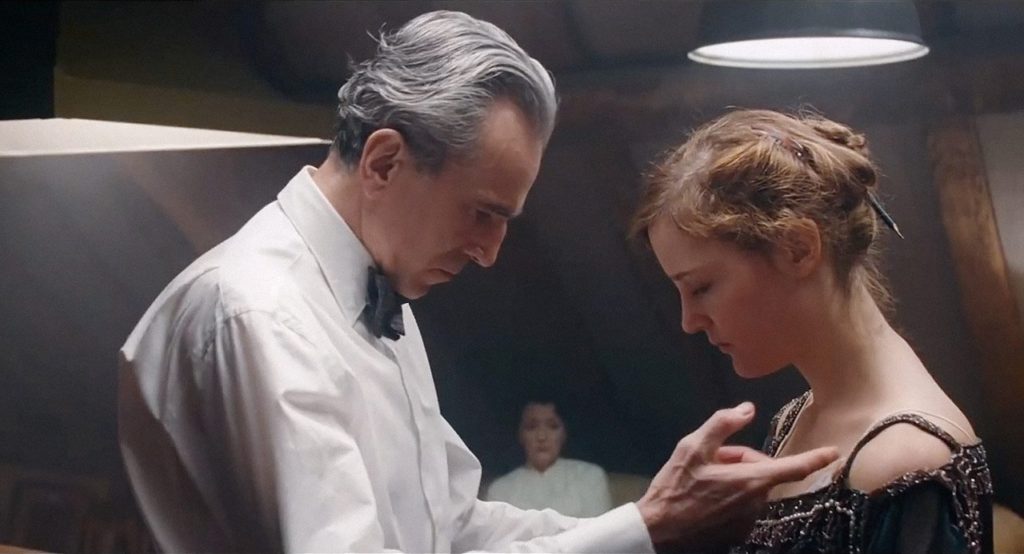Love is a confounding duality, delicate as lace freshly sewn onto a wedding dress and violent as a lacerating word casually let loose from the lips of a paramour. To categorize Paul Thomas Anderson as a romantic would be both accurate and insufficient. He has an abiding conviction in the value of love as a respite from ourselves, yet remains fully cognizant that we as human beings are, more often than not, incapable of expressing that love without making a mess of things. Never has that been more apparent than in his newest film Phantom Thread, a richly textured tale that beguiles as much as it unnerves. Though he has flirted with the comparison before in the past, particularly with his towering epic There Will Be Blood, Anderson has never crafted a film more in rhythm with the sensibilities of Stanley Kubrick. Like the late master’s works, Phantom Thread obsessively tracks the foibles of those who implement rigid, ritualistic behaviors predicated as much upon societal expectations as they are tools of self-preservation. And like Kubrick, Anderson views these behaviors as forms of pretext that fail to mask the awkward humanity beneath them. If anything, more than in Barry Lyndon or Eyes Wide Shut, it is these very sets of formalistic practices which compound and expose our vulnerabilities.
The basis of Anderson’s exploration is in a triad of characters, the most seemingly imposing of whom is Reynolds Woodcock (Daniel Day-Lewis in his purportedly final screen performance). A dressmaker whose day is conducted with the utmost attention to detail and precision, he is rarely seen without his sister and business associate Cyril (Lesley Manville) by his side who he fondly calls “my old so-and-so.” Everything, including the cycle of muses he permits to break their fast with him and Cyril, is calculated to err on the side of predictability. It is telling when he chides his latest creative stimulus (Camilla Rutherford) for eating too many sweets that she shoots back with a remark that he may be mistaking her dietary habits with someone else. This fastidious familiarity, so carefully cultivated by Reynolds and abetted by Cyril, is thrown into crisis by the chance encounter he has with a soft-spoken German waitress named Alma (Vicky Krieps). He orders an exorbitant amount of food, asking her with a mischievous glint in his eye if she will remember everything. It is telling that the impetus for their relationship is one based upon power dynamics with the recurring motif of food serving as a makeshift mediator, and this intricate dynamic is proven to be malleable as the film progresses.

In fact, one of the most intriguing components of Phantom Thread is the way that signifiers of touch, taste and smell have their sensuous qualities dissected and compartmentalized. One of the most fascinating scenes in the film finds Reynolds, after his first dinner with Alma, taking her measurements in his studio. The deliberate lingering on choices of fabric serves less to sexualize Alma than to exemplify the passion Reynolds has in the fullest form of his artistic powers. More than anything, however, Anderson emphasizes the distance between artist and subject and, more importantly, commercial benefactor when Cyril appears to inspect Reynolds’ work. In just one of many bizarrely comic moments, Cyril leans toward Alma and categorically lists the scents she smells off of her body. Her interest in Alma lies less in a predatory nature than one of anthropological curiosity in assessing the young woman’s potential as a prospective fit within the framework of the House of Woodcock. On an archetypal level, what we witness are figures symbolizing artist, subject, and producer, all in communication with one another about the stringent rigidity of the roles they occupy.

Or so it would seem. As Alma comes to take up residence in their home, the Woodcocks both realize they are contending with a woman far more headstrong than either of them anticipated. When Reynolds chides Alma for “too much movement” at the breakfast table, she is perturbed but remains steadfast in her confession to Cyril that she feels he is being “fussy”. Indeed, there is no small measure of irony when Reynolds proclaims to his sister that “a house that won’t change is a dead house.” In his script, Anderson interweaves plenty of darkly comic jabs at the expense of his dressmaker, who at his worst can be an impertinent tyrant. Nevertheless, the film takes the plight of the artist quite seriously. One of the funniest and most oddly moving passages in the film comes in a sequence where Reynolds and Alma, at the behest of the latter, reclaim a dress made for a perpetually despondent client. The climax of this scene is as stirring a declaration of love from Alma as anyone could make to a man like Reynolds. Ultimately, Anderson, in tandem with his superb cast, portrays the importance of fostering conditions that allow the protean artist to thrive while still reserving enormous empathy for those living around them.
These women, who would solely occupy the periphery in a more traditional narrative, gradually come to shape the course of the story in ways I don’t dare spoil. Needless to say, like Guillermo del Toro’s Crimson Peak only a few years prior, Phantom Thread is Anderson’s response to the Gothic Romance. Superstitions, ghosts, and curses are all invoked as causes of calcification in the mistaken predetermination of one’s place in life. The late matriarch of the House of Woodcock bears an overwhelming influence for Reynolds both artistically and pathologically. This wrinkle in the character development of Anderson’s protagonist is yet again one of the director’s signature themes in his ongoing portraits of families and how they are shaped by the presence, or more often than not the absence, of parental figures. If there is a particular entry in Anderson’s filmography that ultimately bears the most resemblance to Phantom Thread, it is surprisingly his nerve-jangled romantic comedy Punch-Drunk Love. But the two films operate within entirely different modes of discourse with their respective genres while still bearing the mark of their maker. One of the myriad delights of Phantom Thread lies in watching how the film sneakily subverts the tropes of the Gothic Romance. Consider, for instance, who the narrator of the film is. On a superficial level, I was reminded of Daphne DuMaurier’s classic Rebecca, as well as the Hitchcock film adaptation. That Anderson subtly pays homage to these artists and the iconic tropes they established while playfully toying with our understanding of how these tropes should or should not traditionally function is nothing but masterful.

There is so much more that can be said about a film like Phantom Thread and the way its visual and sonic textures intertwine with subtextual musings on xenophobic classism in post-war Europe. Yet even on a visceral level, discordantly voracious gestures of yearning find themselves emblematized within the mise-en-scène and beyond, particularly in Jonny Greenwood’s soaring score. What this all amounts to, more than anything, is a thesis in how human beings learn to adapt when their carefully curated existences undergo inevitable changes. Anderson is more optimistic than Kubrick, I would argue, yet he still comes to some discomforting and, ultimately, provocative notions of the ways we operate within the dictates of desire and control, especially in regard to our relationships with that and those we find ourselves inseparable from.
